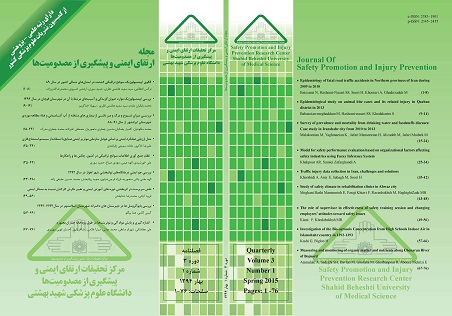نقش سرپرست در اثربخشی دورههای آموزش ایمنی و تغییر نگرش کارکنان نسبت به مسائل ایمنی
ارتقای ایمنی و پیشگیری از مصدومیت ها,
دوره 3 شماره 1 (2015),
1 تیر 2015
,
صفحه 56 - 49
https://doi.org/10.22037/meipm.v3i1.9319
چکیده
سابقه و هدف: آموزش ايمني نقش مهمي در کاهش حوادث و ارتقاء فرهنگ ايمني در سازمانها دارد. در پژوهش حاضر بهطور ويژه نقش سرپرست در اثربخشي دورههاي آموزشهاي ايمني بر تغيير نگرش کارکنان نسبت به مسائل ايمني ارزيابي ميشود.
روش بررسي: 197 نفر (100 نفر گروه آزمايش و 97 نفر گروه کنترل) پرسشنامه نگرش ايمني را قبل از 4 جلسه آموزش ايمني 90 دقيقهاي در طي چهار روز متوالي از ساعت 8 صبح تا 12 ظهر در شرکت ذوبآهن اصفهان تکميل کردند. دوره آموزش ايمني 4 ساعته در شرکت ذوبآهن اصفهان تکميل کردند. اعضاي گروه آزمايش در دوره آموزشي که توسط سرپرست واحد مربوطه ارائه و اعضاي گروه کنترل در دوره آموزشي که توسط مدرس خارج از واحد ارائه ميشد، شرکت کردند. اين پرسشنامه تقريباً 30 روز بعد از آموزش دوباره در هر دو گروه اجرا شد. نتايج گروه آزمايش و کنترل با استفاده از آمارههاي توصيفي و کوواريانس مورد مقايسه قرار گرفتند.
يافته ها: نتايج پژوهش حاضر نشان داد که آموزشهاي ايمني در گروه آزمايش توسط سرپرست در مقايسه با گروه کنترل، اثر مثبت معنيداري بر تغيير نگرش کلي کارکنان نسبت به مسائل ايمني داشته است. بهعبارتديگر، حضور سرپرست نسبت به مدرس خارج واحدي کاري در تغيير نگرش کارکنان نسبت به مسائل ايمني مؤثرتر بود.
نتيجه گيري: استفاده از کارکنان مجرب و سرپرستان واحدهاي مربوط در دورههاي آموزشي ميتواند نقش مهمي در اثربخشي اين دورهها ايفا کند.
- سرپرست، آموزش ايمني، نگرش ايمني، اثربخشي، کارکنان
ارجاع به مقاله
مراجع
References
Stuart A. A blended learning approach to safety training: Student experiences of safe work practices and safety culture. Safety Science. 2014;62:409-17.
Dave M. Watch out: the important of protecting your eyes in the industrial workplace. Occupational
Hazard.2008, 70(10): 23-26.
Saleh TA. Testing the effectiveness of visual aids in chemical safety training. Journal of Chemical Health and Safety. 2011;18(2):3-8.
Baker DP, Amodeo AM, Krokos KJ, Slonim A, Herrera H. Assessing teamwork attitudes in healthcare:
development of the TeamSTEPPS teamwork attitudes questionnaire. Quality and safety in health care. 2010;10:23-45.
Harvey J, Bolam H, Gregory D, Erdos G. The effectiveness of training to change safety culture and attitudes within a highly regulated environment. Personnel Review. 2001;30(6):615-36.
Rundmo T, Hale AR. Managers’ attitudes towards safety and accident prevention. Safety Science.
;41(7):557-74.
Clarke S. Safety climate in an automobile manufacturing plant: The effects of work environment, job
communication and safety attitudes on accidents and unsafe behaviour. Personnel Review. 2006;35(4):413-30.
Noe RA. Employee training and development: McGraw-Hill/Irwin Boston, MA; 2002.
Ellinger AE, Ellinger AD, Keller SB. Supervisory Coaching in a Logistics Context. International Journal of Physical Distribution & Logistics Management. 2005;35(9):620-36.
Rodríguez CM, Gregory S. Qualitative study of transfer of training of student employees in a service
industry. Journal of Hospitality & Tourism Research. 2005;29(1):42-66.
Macneil MC. Exploring the Supervisor Role as a Facilitator of Knowledge Sharing In Teams. Journal of European Industrial Training. 2004;28(1):93-102.
DeSimone RL, Werner JM, Harris DM. Human resource development. 2002.
Nijman D, Nijhof W, Wognum A, Veldkamp B. Differential effects of supervisor support on transfer of training. University of Twente, Enschede. 2004.
Golemen D. Leadership That Gets Results. Harvard Business Review. 2000;78(2):78-90.
Blanchard PN. Effective Training, Systems, Strategies, and Practices, 4/e: Pearson Education India; 2007.
Ismail A, Chandra Segaran S, Cheekiong T, Ong G, editors. The mediating role of motivation to learn in the relationship between supervisors’s role and job performance. The Sixth Asian Conference of the Academy of HRD;2007.
Dawley MC, Andrews NSB. (2008). Mentoring, Supervisor Support And Perceived Organizational Support: What Matters Most? Leadership & Organization Development Journal. 2008;29(3):235 – 247.
Harris R, Simons M, Bone J. More than Meets the Eye? Rethinking the Role of Workplace Trainer: ERIC; 2000.
Sisson GR. Hands-On Training: A Simple and Effective Method for on the Job Training: Berrett-Koehler Publishers; 2001.
Ismail A, Bongogoh S, Segaran SCC, Tudin R, Ajis MN, Wan Ismail WK. Supervisor Communication and Motivation to Learn as a Predictor of Positive Individual Attitudes and Behaviours: A Study in One City-Based Local Authority. Journal Kemanusiaan. 2009, 13: 19-29.
Lim DH, Johnson SD. Trainee Perceptions of Factors That Influence Learning Transfer. International
Journal of Training and Development. 2002;6(1):36-48.
Munteanu MR. Safety attitudes in the Ontario construction: University of Toronto; 2005.
Ng TWH, Sorensen KL. Toward a future understanding of the relationship between perception of support and work attitudes: A meta-analysis. Group Organization Management. 2008;33(3):243-68.
Lim DH, Morris ML. Influence of Trainee Characteristics, Instructional Satisfaction and Organizational Climate on Perceived Learning and Training Transfer. Human Resource Development Quarterly. 2006;17(1):85-115.
Johlke MC, Stamper CL, Shoemarker ME. Antecedents to boundary-spanner percieved organizational
support. Jpournal of Managerial Psychological. 2002;17(2):116-28.
Chiaburu DS, Tekleab AG. Individual and Contextual Influences on Multiple Dimension of Training
Effectiveness. Journal of European Industrial Training. 2005;29(8):604-26.
Baum WM. Evasion, private events, and pragmatism: A reply to Moore's response to my review of
Conceptual Foundations of Radical Behaviorism. Journal of the experimental analysis of behavior. 2011;95(1):141-4.
Velada R, Caetano A, Michel JW, Lyons BD, Kavanagh MJ. (2007). The Effects of Training Design,
Individual Characteristics and Work Environment on Transfer of Training. International Journal of Training and Development. 2007;11(4): 282-94.
Eisenberger R, Gokhan K, Stinglhamber F, Pedro N, Becker TE, Gonzalez-Morales MG, Steiger-Mueller M. Journal of Applied psychology. 2010;95(6): 1085-103.
Chin HC. The effect of person-supervisor fit and person-workgroup fit on role performance, job satisfaction and perceived support: The airline crew. Master's Thesis, Human resource management, 2009.
- چکیده مشاهده شده: 416 بار
- PDF (English) دانلود شده: 1284 بار
